By Letting AI Shop For Us, How Much of Ourselves Are We Giving Up? – Latest Fashion Trends & Style Tips August 15, 2025 at 06:15PM
📰 By Letting AI Shop For Us, How Much of Ourselves Are We Giving Up?
✨ Fashion Insights & Trends:
AI-powered hyper-personalization is already changing the way we shop. Brands are investing in technologies — from chat bots to virtual try-on — that not only make shopping more efficient and frictionless, but also give people exactly what they want.
This means retailers are getting to know their customers better: their style choices, keystrokes, shopping habits and more. But hyper-personalization could come at a personal cost; someone's moods, movements, desires, behaviors and even facial expressions could all become data points brands use to make recommendations. We could even see retailers shipping items to someone's door before they've consciously decided to buy them.
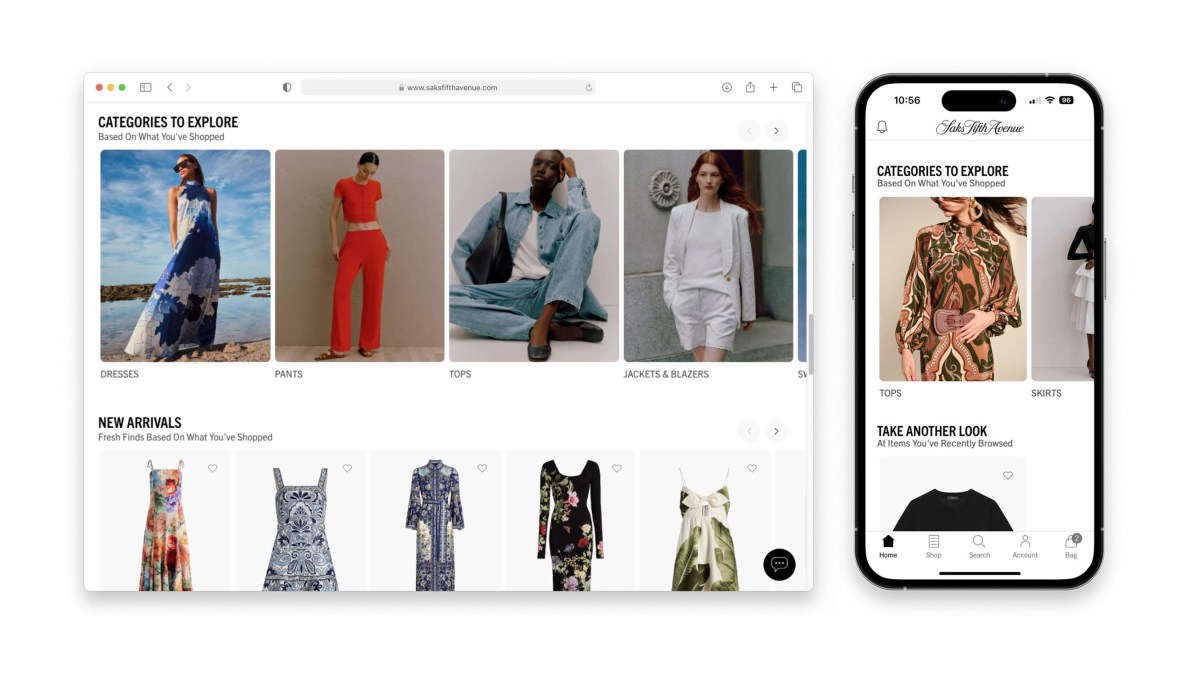
Image: Courtesy of Saks Fifth Avenue
AI-powered shopping experiences are nascent, but being rolled out quickly. Just this week, Saks.com introduced AI-fueled personalization to its homepage, meaning all visitors will see content and recommendations that are customized just for them, based on machine learning algorithms that continuously leverage their real-time shopping behavior. (The company plans to roll this out across all its luxury retailers, i.e. Neiman Marcus and Bergdorf Goodman.)
Shoppers can also use Daydream, a personal AI-powered shopping agent, that gets to know your fashion preferences (and icks) before curating items from 8,000+ brands. They can head to the Cetaphil website and scan their skin for a tailored, multi-step routine. They can brainstorm an outfit with Tonita, a fashion-focused chatbot modeled on ChatGPT, or go straight to ChatGPT and use its recently updated "conversational shopping" feature, which spans the entire shopping journey. Google's new AI Mode, meanwhile, offers personal photo use for virtual try-on, personalized product discovery and automated checkout. And in-store at Selfridges, there are a range of IRL AI tools, including Kaorium, a perfume assistant that recommends scents based on emotions.
The future is truly here: little robots, designed to serve us by learning all our unique idiosyncrasies, churning out perfectly personalized products, so people can spend more time doing anything else. While it can feel exciting, what these tools are doing is laying the groundwork for what's next: shopping that doesn't just respond to us, but anticipates what we want.
Of course, this requires consumers to give up their data and teach a machine (backed by some tech company) about their most intricate patterns and behaviors. At this point, most of us have conceded (or even become numb to) to big tech, accepting that casually looking up a pair of shoes — or even mentioning a pair in proximity to our phone — means being bombarded with ads across every social media feed and website. The lines between convenience, data, invasiveness and personalization have become so blurred that many people are simply unfazed by privacy risks and algorithmic manipulation. But should we be more concerned as this technology evolves?
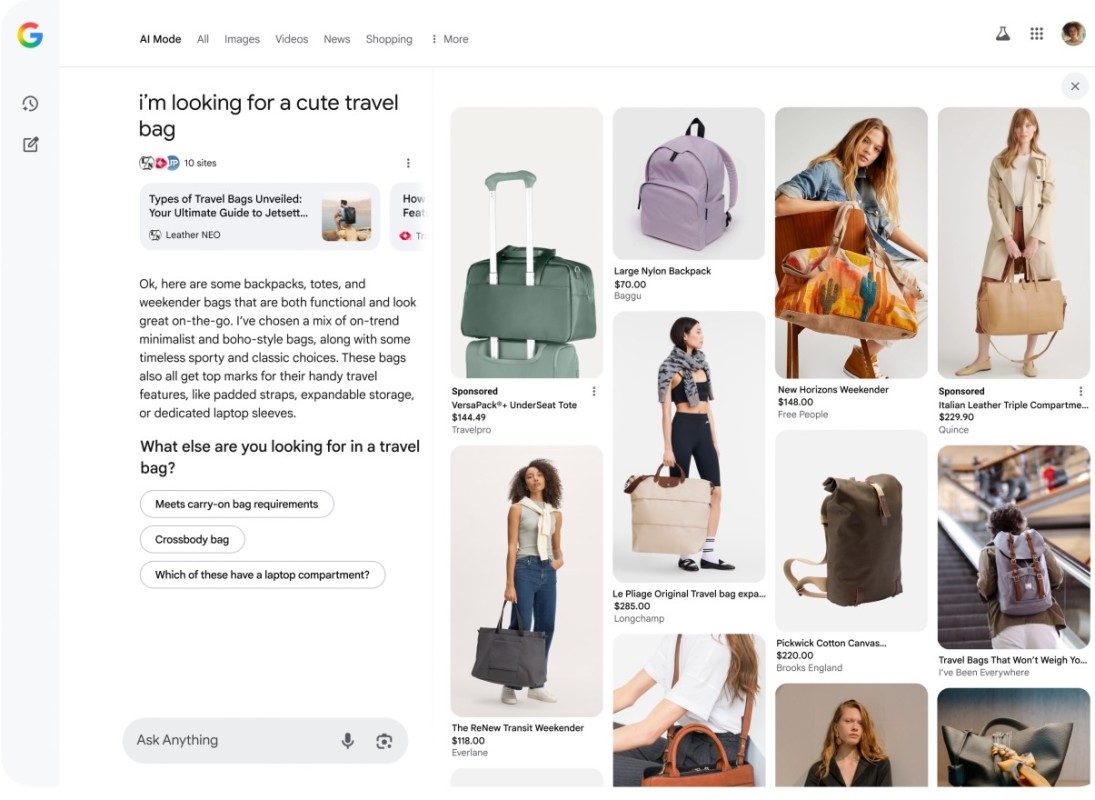
Image: Courtesy of Google
Fergal Glynn, the chief marketing officer and AI security advocate of Mindgard (a London-based firm that evaluates the security of AI systems and models), refers to this tension as the "privacy paradox," explaining that, "People crave the benefits of personalized product recommendations, all the while being concerned about how their data is handled. Retailers may be handling personalization well, but they still struggle to meaningfully address privacy concerns. Striking the right balance remains the real challenge."
That paradox plays out in everyday decisions for consumers. "Companies are always making promises of privacy and safety, but that's not always true; there are always breaches," New York City-based fashion enthusiast and pilates studio coordinator, Whitney Roberts, 34, points out. "So, I don't really want to give up too much data."
Trend forecaster Elizabeth Bowring warns that we may be thinking about our data in outdated terms. "Data isn't just about passwords and finances, it's about identity, behavior, intent and psychology. When those patterns are aggregated, they can be used not just to sell, but to influence," she explains. "They can shape political sentiment, consumer habits and even cultural shifts. The real danger isn't only in what's taken, it's also in what's predicted, and then manipulated. The implications aren't personal, they're structural. And that's precisely why so many people overlook them. It's not just about you, it's about how you fit into a model that can influence others. What we give away now shapes the guardrails (or lack thereof) for future generations."
New realms of hyper-personalization, based on mood, biometrics and predictions, are just around the corner. While some companies flirt with the idea, others have already put it in motion. In 2018, Amazon patented technology that could let Alexa analyze one's voice to determine whether they are sick or depressed, and sell related products in response. Earlier this year, Chinese tech giant Alibaba announced a new AI model — R1-Omni — that can interpret emotions from videos; in a demonstration, it examined facial expressions, posture and gestures, as well as tone, pitch variations and vocal patterns. Then there's Entropik's Affect UX, a cloud-based SaaS platform for UX designers and researchers that uses high-precision eye tracking and facial coding to "offer you a peek into the minds of your customers."
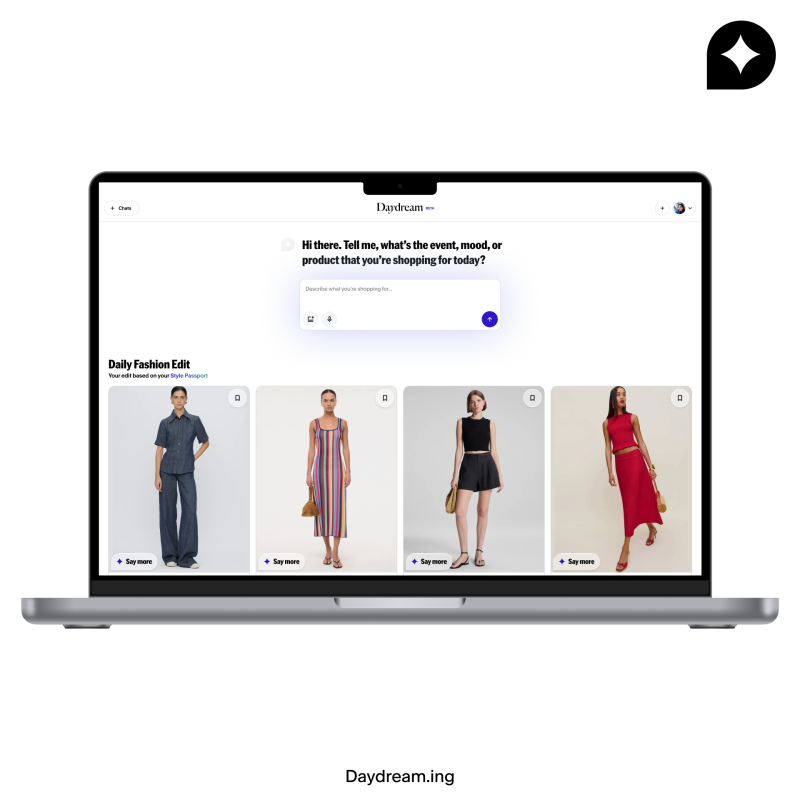
Photo: Courtesy of Daydream
As these systems evolve to understand emotions, invisible behavioral nudging is likely to show up next.
"It's incredibly easy to cross into emotional manipulation," Jacquelyn Berney, president of VI Marketing and Branding, an independent agency known for delivering behavior-changing campaigns, tells me. (Berney is also a recognized expert on the intersection of AI, consumer behavior and brand trust.) "If you're sad, should a platform really push a retail therapy moment? Or if you're anxious, is it ethical to nudge you toward a comfort purchase? Emotions are personal and your own, it's a very fine line to walk."
After all, emotions directly influence how we spend, and are central in how retailers encourage us to throw around out cash. Today, that looks like manufactured urgency through limited-time drops and deals; retail environments with appealing lighting and scents; and strategic campaigns that foster a sense of intimacy, alignment and belonging.
WGSN's "Future Consumer 2027: Emotions" report argues that how people feel will be a structural necessity to connect with customers over the next few years. Specifically, those feelings will include "strategic joy," "witherwill" (the desire to escape responsibility) and "suspicious optimism," which is driven by awe, fear and disillusionment. "As 2027 approaches, consumers will navigate complex relationships with technology, oscillating between fascination and apprehension," the report reads. "These drivers will propel us toward aspirational states of wisdom, balance and trust in our technological interactions.”
Already, marketing blogs are suggesting that retailers use AI to watch customers' "faces and movements" to manipulate in-store experiences, because it's not just your feelings that brands want to read, it's also your body. Most people are understandably hesitant to share their biometric data with businesses, including all the Gen-Z, Millennial and Gen-X consumers I spoke with. "I don't feel comfortable with doing that," says Roberts. "I don't know what other biometrics would be needed in addition to facial recognition, fingerprints and iris recognition, but I don't really see how that translates into making a better shopping experience for me."
There's beauty tech, like Neutrogena's Skin360, which scans a person's selfie and scores their skin health. The risk? A raw image of a facial biometric could potentially reveal health information that an individual may not want to provide, or did not consent to having collected. And once that information is out there, unlike leaked passwords or emails, we can't change it or take it back.
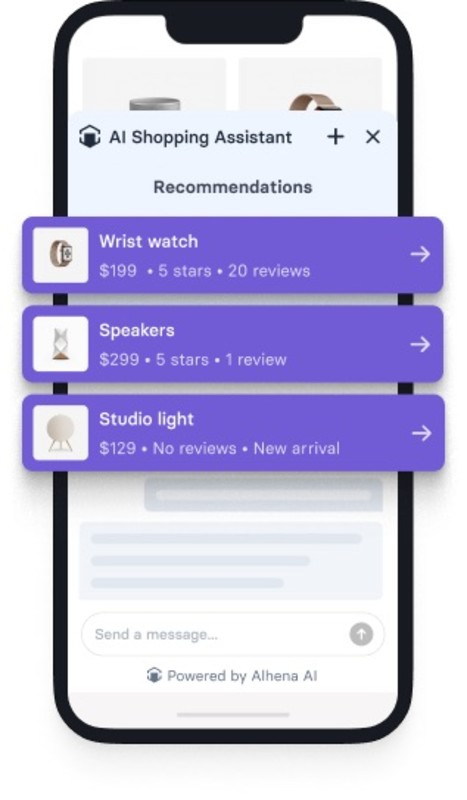
Image: Courtesy of Alhena
Our information, from behaviors to moods to biometrics, isn't being collected in vain. According to a 2025 report by RepAI, 12% of shoppers who engage with AI-powered chat make a purchase, compared to just 3% of those who do not. Alhena, whose AI features are used by brands (like Tatcha and Victoria Beckham) to personalize their shopping experiences, found that customers who had hyper-personalized experiences were four times more likely to buy something. They also spend 40% more, thanks to AI-powered upselling, according to Co-founder and CEO Ashu Dubbey. Meanwhile, Saks already found, based on an earlier soft launch, that its new AI features drove a 7% increase in revenue per visitor and improved conversion by nearly 10%.
It's great news for retailers, especially as consumer spending slows down amid tariffs and economic turmoil. But will customers continue being open to what can increasingly feel like manipulation?
"That kind of emotional data can be used not just to suggest products, but to encourage overconsumption or shape your behavior in ways you may not even notice," explains Sofía Lopera Cardona, a creative director and digital strategist who's worked with brands like Puma and Rentala. "The more emotional data these systems have, the more they can influence our choices without us fully realizing it."
In luxury retail, VIP clients may work long-term with (human) personal shoppers who can anticipate — and make purchases based on — their stylistic inclinations. AI can democratize this level of service, as was the intent behind Saks' strategy: "By bringing the one-to-one relationship our customers experience with their stylist in stores to the onsite experience, we have reached an important milestone," said Emily Essner, Saks Global's president & chief commercial officer, in a statement. With AI-powered subscription services like Stich Fix, Dailylook and Bnto, people can already automate the discovery part of their shopping journey, but users still retain some agency (for now).
In 2014, Amazon filed a patent for anticipatory shipping, a system to send packages to customers before they've placed an order. It's another signal that retailers could soon be automating our desires before we've even consciously experienced them.
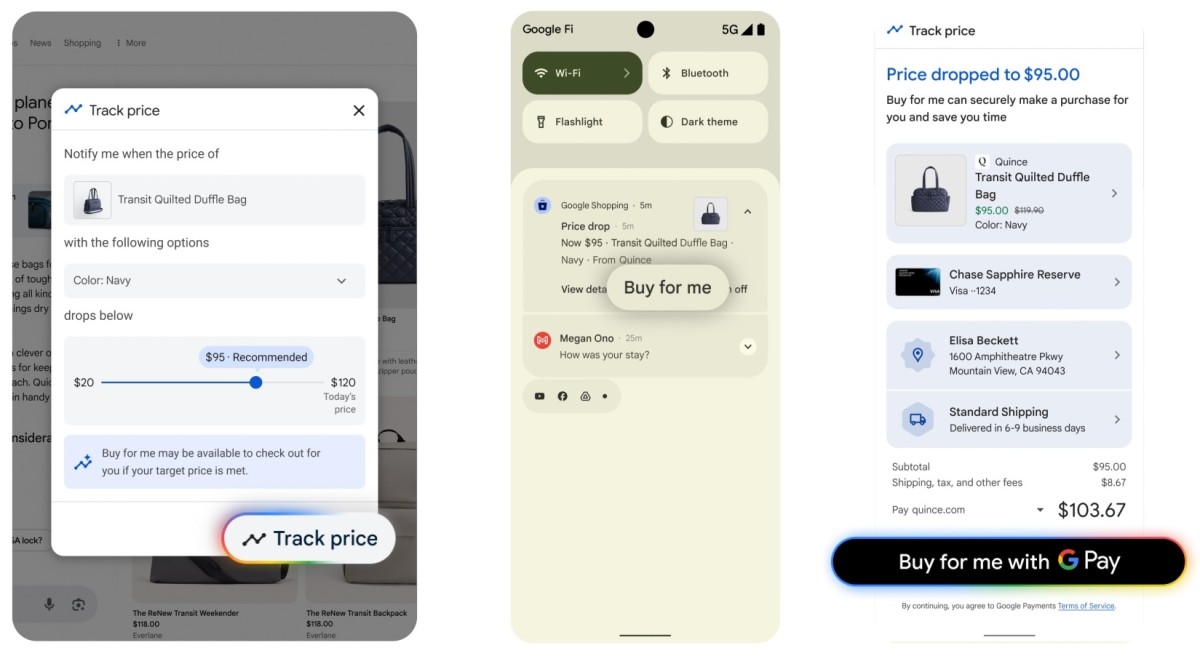
Image: Courtesy of Google
"AI fashion stylists and AI agents that know me and autonomously act upon my behalf is both a dream and giving 'Black Mirror'-levels of dystopia," Janey Park, 42, shares. Park is a fashion tech expert and founder of The Digital Runway, a media and advisory platform. While she would love an AI assistant that pre-selects options for her to approve, "full auto-checkout without confirmation needs to be tried and true with ironclad trust or a free return policy as a safety net," she feels.
For fashion blogger Celeste Renee, 25, the concept is far too invasive. "The obvious concern is, what if it picks something I hate? But what feels even more likely, and more unsettling, is that AI could get so good at learning my preferences that it actually nails the purchase. That's the issue. It takes away a bit of my agency. Fashion is personal. It should be intentional. And this kind of automation feels like outsourcing a really important part of self-expression."
An easy (and eerie) comparison to draw is to Spotify, which revolutionized music-sharing but ultimately killed organic discovery. Is fashion next?
Bowring (the trend forecaster) stresses the importance of shopping consciously. "I'm extremely private with my information. I monitor what I share, where I shop and how I spend, because in today's world, nothing is truly private unless you, the individual, take responsibility for protecting it," she says. "Ultimately, the conversation needs to shift from fear to empowerment. Consumers don't need to disengage; they need to be equipped with transparency and understand exactly what the ramifications might be."
As with most technological advancements, the onus of ethical usage falls on the businesses that wield it. In July, Shopify implemented some limitations around agentic AI, which refers to AI systems that operate autonomously, making decisions and taking actions with minimal human intervention. The widely used commerce platform added a stipulation to its code stating: "Automated scraping, 'buy-for-me' agents, or any end-to-end flow that completes payment without a final review step is not permitted." In the same month, cybersecurity firm Cloudflare announced tools to block AI bots and monetized scraping. Overall though, clear customer protections and AI limitations are tough to find if they exist at all.
Skeptical though we may be of AI's proliferation in fashion and beauty retail, there is a potential upside. With proper oversight, by specialized teams focused on radical transparency, AI could do some good.
"It can help us not feel overwhelmed by the choices, help us be more informed, educated and less impulsive consumers," offers Dandapani Sivakumar, founder and CEO of Tonita. "For people with accessibility challenges, time constraints or decision fatigue, this is not just convenience, it's empowerment."
Ultimately, it will be crucial for businesses to provide clear boundaries and transparency around data use. Otherwise, convenience could come at the cost of personal freedom, and that's not a price worth paying.
📌 Love fashion? Follow us for daily updates on our fashion blog! 🌟
🔹 #FashionTrends #StyleTips #OOTD #By Letting AI Shop For Us, How Much of Ourselves Are We Giving Up?
Comments
Post a Comment